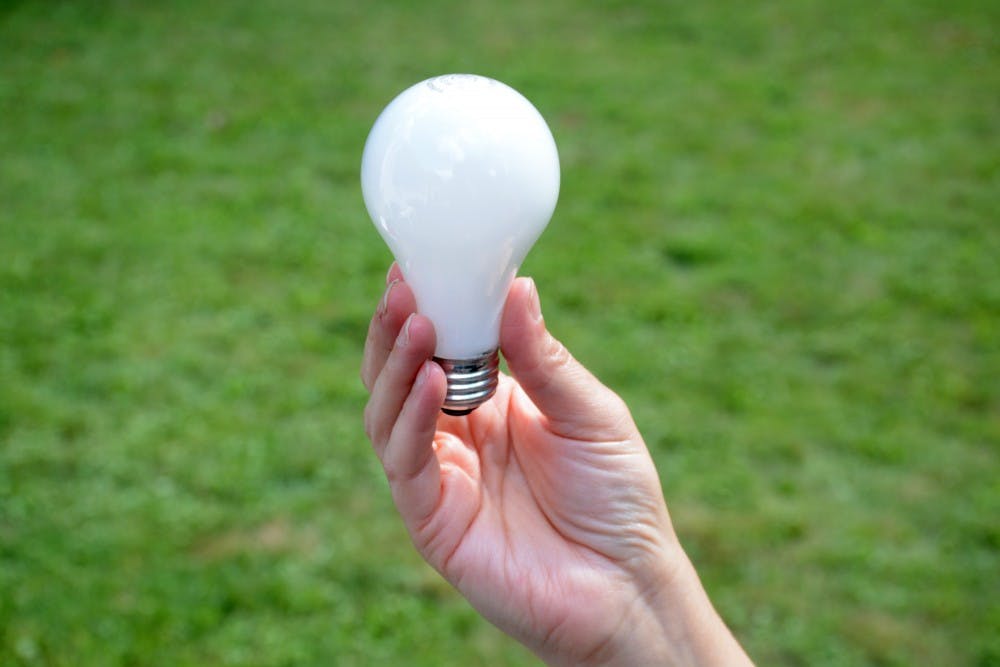This summer, the University participated in a state-wide initiative June 27 in an effort to reduce electricity usage. For one hour, all items deemed non-essential were turned off from 2-3 p.m. in an event called “U.Va. Saves Hour.”
Led by the Office for Sustainability — the University’s official bureau for environmental affairs — the University encouraged students, faculty and staff to unplug kitchen and desk appliances, turn-off lights and asked the University community to be more conscious of the items they leave running when away from workspaces.
“We go through buildings and shut down equipment like air handlers and pumps, which serve spaces that are unoccupied — like lecture auditoriums,” said Office for Sustainability Coordinator Lela Garner in an email to The Cavalier Daily.
This year, the University aimed to save 5.28 megawatts of electricity. For comparison, this is enough to power 3,915 homes.
Leigh Anne Ratliff, a representative from the energy management company CPower, reported that there was a committed performance of 115 MW state-wide. The University met their goal with exactly 5.28 MW, making them the largest of college participants.
Other colleges in the state that participated include Virginia Tech, James Madison, George Mason and William and Mary — among 60 other community colleges and as well as nearly 300 K-12 schools.
“U.Va. has had consistent success in the program through a large focused campus effort,” Ratliff said.
“U.Va. Saves Hour” is an annual event that the University holds in June, but Garner stated that in the case of an electrical grid emergency, the event will be repeated on an as-needed basis to relieve the burden on the power grid by another 5.28 MW.
To further promote energy conservation awareness, the U.Va. Office of Sustainability plans to hold a few more outreach and engagement events — especially for incoming first-years, faculty and staff — in the coming fall semester.
For example, there will be the Dorm Energy Race in October, which will take place in first-year dorms and residential colleges. It encourages the residents to turn off lights, unplug electronics and take the stairs whenever possible. The residence area which conserves the most electricity will be awarded with a free food fest in November.
University and Charlottesville community members can also participate in the Renewable Energy Expo in October, which is an opportunity for local labs and organizations to showcase innovative sustainability research that is committed to creating a clean energy future.
Efforts to encourage a sustainability mindset extends beyond the University’s administrative level. Carson Lambert, a rising third-year College student and the public relations and outreach chair for Green Grounds — a contracted independent organization committed to raising awareness for sustainability issues — shared his take on the initiative.
“We really like the idea of an energy-saving hour as a way to spread awareness and investigate ways to cut back,” Lambert said in an email. “However, we think it would be a much more effective initiative if it was held in the fall or spring semester when students are on grounds to participate in and learn from the energy-saving efforts.”
Lambert shared that many of Green Grounds’ members are actively involved with the Office for Sustainability, and he hopes they can make strides to implementing more of these initiatives throughout the school year to engage the student body as a whole.
In terms of actionable ideas, Green Grounds has identified several areas where the University can partake in energy saving practices year-round, including turning off unnecessary indoor lights that are left on all night and updating old wiring and HVAC systems that burn energy.
“It would be nice if the University could move towards a more renewable energy source than the current plan,” Lambert said. “All that being said, we are very happy with the commitment that President Ryan has made to sustainability, and we will do our part to hold the new administration accountable to these promises.”







